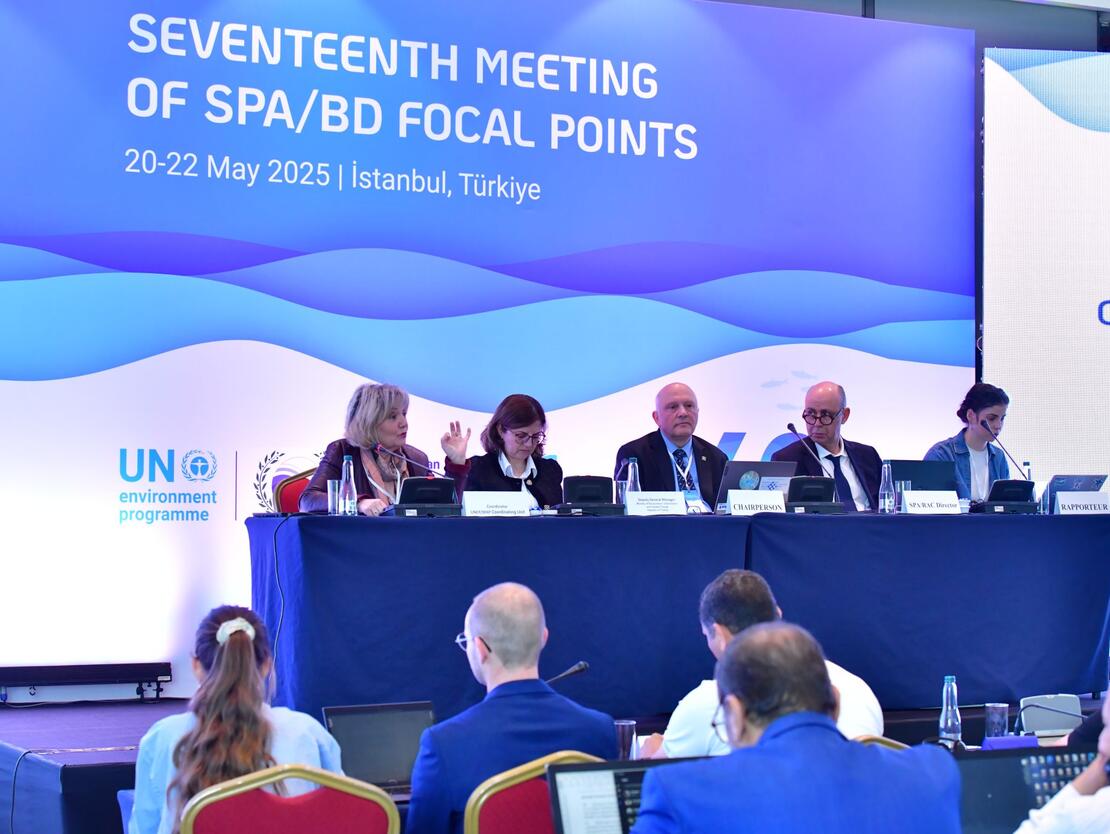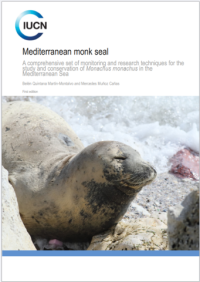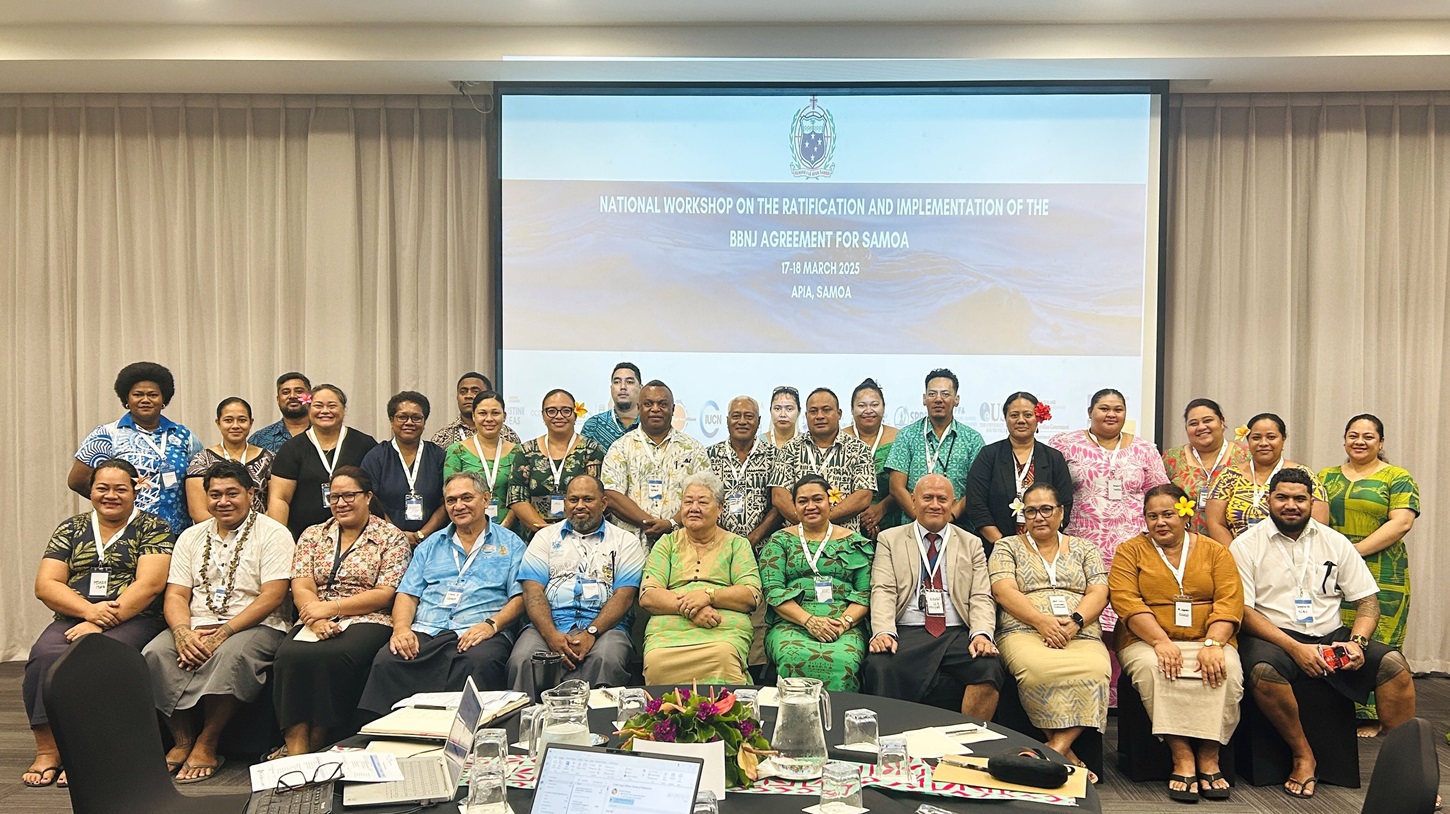IUCN presents key marine conservation contributions at Barcelona Convention Focal Points Meeting
At the 17th Meeting of the Focal Points for Specially Protected Areas and Biological Diversity in the Mediterranean, IUCN Med presented two key contributions: a regionally harmonized guide for monitoring the endangered Mediterranean monk seal and the Mediterranean blue carbon strategy—both highly relevant tools for advancing marine conservation and climate resilience in the region.

The Seventeenth Meeting of the SPA/BD Focal Points is taking place in Istanbul, Türkiye, from 20 to 22 May 2025
At the 17th Meeting of the Focal Points for Specially Protected Areas and Biological Diversity in the Mediterranean—held under the framework of the Barcelona Convention— IUCN Med reaffirmed its commitment to regional cooperation and science-based marine conservation. The Centre’s contributions underscored the importance of practical tools, knowledge exchange, and collaboration for addressing biodiversity loss and climate challenges in the Mediterranean.
A highlight of IUCN Med’s participation was the presentation of its latest publication, “Mediterranean Monk Seal: A comprehensive set of monitoring and research techniques” Developed in collaboration with over 15 experts from various Mediterranean countries, the guide offers a harmonized, practical framework for studying and protecting Monachus monachus, one of the world’s most endangered marine mammals. Structured across seven chapters and featuring fourteen fact sheets, the guide sets out protocols for field monitoring, citizen science engagement, and data management. IUCN Med also announced the creation of a dedicated monk seal expert group, with subworking groups on priority issues, and the upcoming organization of its inaugural meeting.
Blue Carbon
Another key issue addressed was the recognition of the Mediterranean blue carbon strategy as a foundational document for the region’s conservation agenda. IUCN Med welcomed its inclusion among the meeting’s informative materials, noting that the strategy provides a much-needed framework for the protection, restoration, and sustainable management of blue carbon ecosystems—such as Posidonia oceanica meadows and other seagrasses. These habitats are essential not only for supporting marine biodiversity and protecting coastlines, but also for their vital role in climate change mitigation and sustaining coastal livelihoods.
“To ensure that both documents are aligned with national priorities and practical needs, IUCN Med will seek feedback from Contracting Parties on the monk seal monitoring guide and the blue carbon strategy. This consultative approach aims to strengthen the relevance, usability, and impact of these tools as they are integrated into national and regional planning frameworks”, commented Mercedes Muñoz Cañas, Marine Biodiversity and Blue Economy Programme Manager at IUCN Med.
Throughout the meeting, IUCN Med and the IUCN Commission expert groups involved expressed strong support for the ongoing efforts of Specially Protected Areas Regional Activity Centre (SPA/RAC) and the Contracting Parties , while also highlighting challenges that still require collective attention—such as improving Marine Protected Areas management effectiveness, accelerating the implementation of Regional Action Plans, and ensuring science-based updates to species listings under the SPA/BD Protocol. IUCN Med reiterated its commitment to providing technical support, enhancing the science-policy interface, and strengthening regional cooperation, including through its collaboration with SPA/RAC under a recently signed Memorandum of Understanding.
The organization also emphasized the importance of credible methodologies for identifying and reporting Other Effective area-based Conservation Measures (OECMs) in the Mediterranean, ensuring alignment with both regional practices and global biodiversity targets. As an active member of the Ad hoc Group of Experts for Marine Protected Areas (AGEM), IUCN Med reaffirmed its dedication to supporting regional planning, evaluation, and knowledge-sharing processes.
Another important announcement during the meeting was the launch of a new Mediterranean Expert Group on MPA management effectiveness under the IUCN Green List initiative, to help strengthen outcome-based, evidence-driven MPA systems.
As the meeting concluded with the presentation of the Draft Programme of Work for 2026–2027, IUCN Med expressed its full support and confirmed its readiness to contribute to the implementation of shared goals for the protection of marine and coastal biodiversity in the Mediterranean.

Further information:

